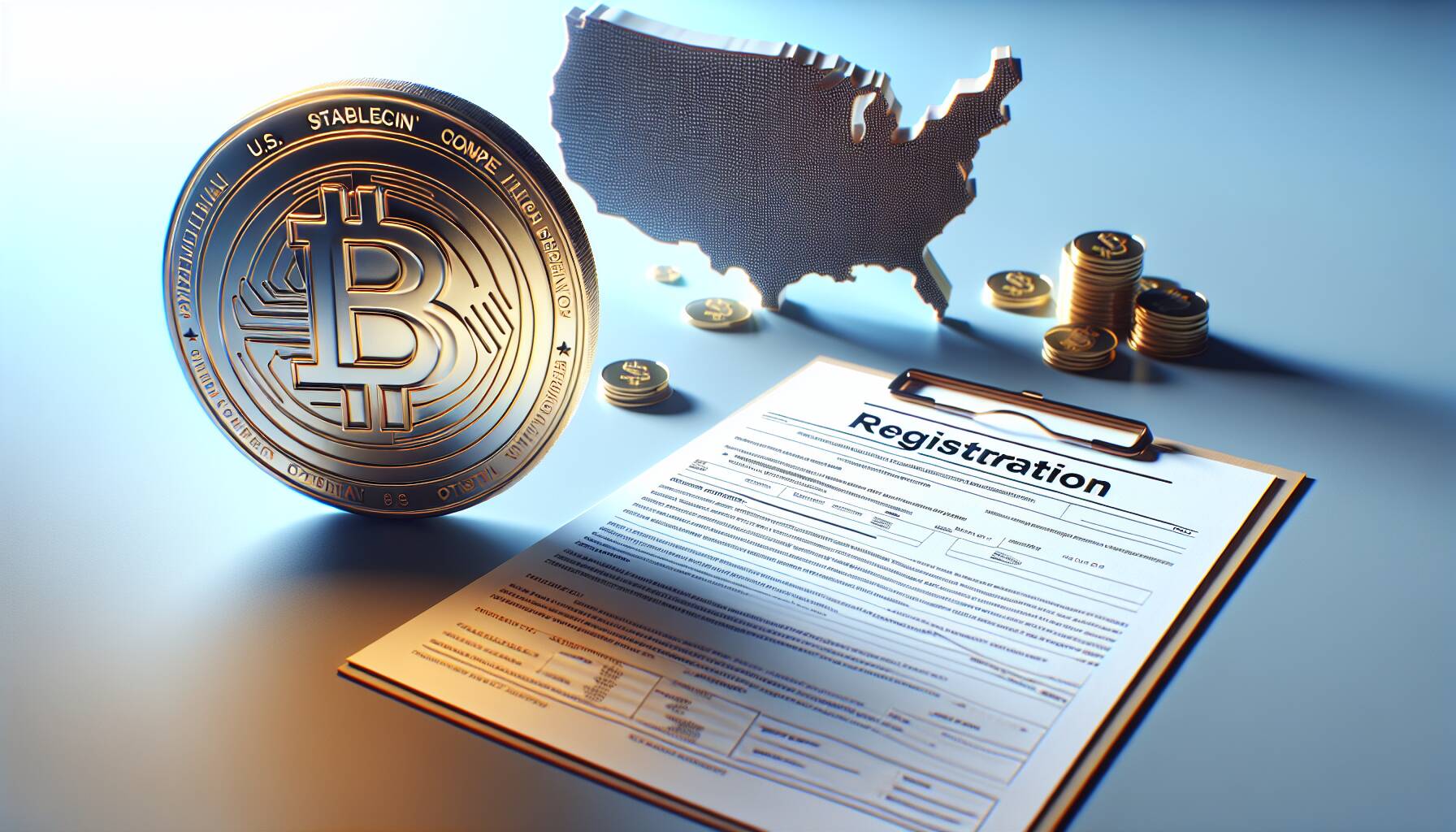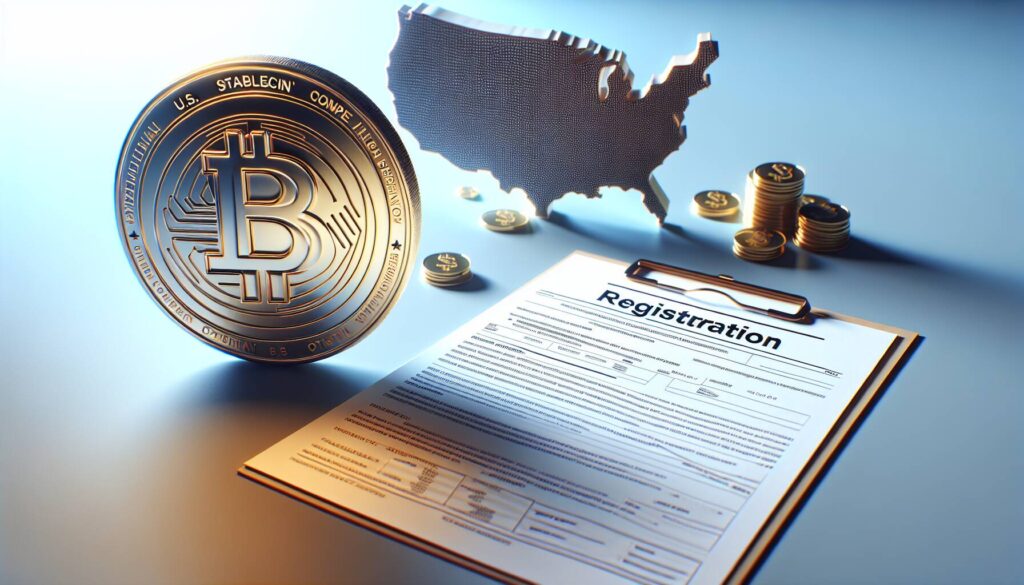In a recent interview with Bloomberg, Jeremy Allaire, the co-founder and CEO of Circle, emphasized the need for companies issuing dollar-pegged digital tokens to register within the United States. “It shouldn’t be a free pass,” Allaire asserted, advocating for regulatory compliance to ensure that no entity can circumvent U.S. laws while conducting business with American consumers. This statement comes as regulatory discussions surrounding stablecoins gain momentum, particularly following the proposals introduced by Tennessee Senator Bill Hagerty aimed at establishing a structured oversight framework for these digital assets.
Circle’s USDC remains a leading player in the stablecoin market, currently holding the position of the second-largest dollar-backed stablecoin by market capitalization, trailing only behind Tether’s USDT. The broader stablecoin market has achieved a significant valuation of approximately 2 billion, a crucial component that underpins much of the cryptocurrency trading landscape and facilitates international money transfers.
“Whether you’re an offshore company or based in Hong Kong, if you want to offer your dollar stablecoin in the U.S., you should need to register in the U.S. just like we have to go register everywhere else,” Allaire commented, highlighting the need for regulatory parity.
Further reinforcing this sentiment, Dante Disparte, Circle’s Chief Strategy Officer, echoed these views by stating that every company involved in issuing dollar stablecoins should have the opportunity and responsibility to register in the U.S. to foster a fair competitive environment. He argued that no company should receive an exemption from necessary safety regulations and supervisory measures.
The dialogue around stablecoins has gained attention as major financial institutions, including PayPal, express their intentions to expand into this space. Michelle Gill, general manager of PayPal’s small business and financial services segment, shared insights into the company’s plans to integrate their PYUSD stablecoin into various products. This shift indicates a growing trend among established companies to leverage stablecoins, enhancing their financial offerings in a rapidly evolving digital economy.

Key Insights on Stablecoin Regulation and Impact
The statements and developments surrounding stablecoin regulation, particularly by industry leaders at Circle, highlight critical implications for the cryptocurrency landscape and its users.
- Call for Registration in the U.S.: Jeremy Allaire, co-founder and CEO of Circle, emphasizes that companies issuing dollar-pegged digital tokens should register in the U.S. to ensure compliance with U.S. laws.
- Importance of Regulatory Framework: The introduction of a stablecoin oversight bill by Senator Bill Hagerty aims to create a structured regulatory environment for dollar-backed stablecoins.
- Market Size and Relevance: The stablecoin sector boasts a market cap of 2 billion, indicating its significant role in cryptocurrency trading and international money transfers.
- Competitive Landscape: Allaire’s assertion suggests that all companies, regardless of their base location, should adhere to the same regulatory standards to ensure fairness and consumer protection.
- Expansion Plans of Major Players: Companies like PayPal are looking to expand their stablecoin offerings, integrating them into their product lines, which could enhance user engagement and broaden the adoption of stablecoins.
“No company that issues dollar stablecoins should get a free pass from safety and soundness rules and appropriate prudential supervision.” – Dante Disparte
These developments may impact readers, especially those involved in cryptocurrency trading, by emphasizing the importance of regulatory compliance, fostering trust in digital assets, and potentially enhancing the safety and reliability of their investments.
Stablecoins Under the Regulatory Microscope: Circle’s Perspective
The stablecoin landscape is rapidly evolving, with Circle’s co-founder and CEO Jeremy Allaire emphasizing the need for U.S. registration for digital tokens pegged to the dollar. This call for regulatory oversight reflects a broader trend in the cryptocurrency market where prominent players advocate for uniform compliance standards to enhance trust and accountability. Circle’s USDC currently holds the title of the second-largest dollar-backed stablecoin, trailing Tether’s USDT, which showcases a competitive space ripe for scrutiny and strategic positioning.
One of the competitive advantages of Circle’s stance is the push for regulatory clarity, which could foster greater institutional confidence in the stablecoin market. By advocating for uniform standards, Circle could appeal to investors who prioritize safety and security in their digital asset transactions. This could work to Circle’s advantage as more U.S. and international businesses seek assurance regarding compliance as they integrate stablecoins into their operations. Furthermore, by positioning itself as a champion of regulatory adherence, Circle can differentiate itself from competitors who may operate in less regulated spaces, potentially winning over a cautious investor demographic.
However, there are significant challenges that could arise from such a regulatory approach. For instance, imposing stringent requirements might deter smaller startups and international firms from entering or competing in the U.S. market, constraining innovation and limiting consumer choice. If Circle and similar entities advocate for a more regimented oversight model, it could inadvertently solidify Tether’s dominance, as it may have the resources to navigate through these regulatory hurdles more effectively.
Moreover, this drive for regulation could hinder the operational flexibility that has characterized the cryptocurrency market, creating a paradox where increased oversight intended to protect consumers may lead to reduced accessibility and increased costs for those looking to issue stablecoins. This dynamic could benefit large, established firms capable of maintaining compliance while presenting challenges for startups that may struggle to meet the regulatory demands, thus creating a potential consolidation within the industry.
Certainly, major entities like PayPal are closely observing these developments. With plans to expand its PYUSD stablecoin, the company could emerge as a formidable competitor if it leverages regulatory challenges to its advantage. PayPal’s ability to rapidly integrate stablecoins into its extensive range of products may enable it to capture market share from players like Circle and Tether if those companies become bogged down by regulatory requirements.
In summary, while Circle’s call for U.S. registration for dollar-pegged stablecoins aligns with a broader effort to establish trust in the crypto industry, it poses both opportunities and challenges. It may enhance competition for established players but could also stifle innovation and accessibility for newcomers and smaller firms eager to thrive in the burgeoning stablecoin ecosystem.

















